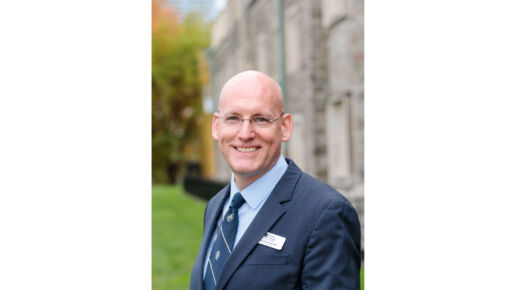Five years into his role and just before he begins a one-year sabbatical, we caught up with Trinity’s Dean of Divinity and Margaret E. Fleck Chair in Anglican Studies, the Rev. Prof. Christopher Brittain (MDiv ’96, PhD ’02).
1. Your popular undergraduate course, Religion at Ground Zero, explores the relationship between religion and our response to historical tragedies. How has its content been impacted by recent global events?
Chris Brittain: The course is always offered in the winter term and so, in January 2020, we started the course as usual, but noted at that time that there was something developing in Wuhan, China. Within a few weeks, everything had changed, and we were suddenly completing the course online. The pandemic became a big part of the course and our discussions, as we all tried to process what was happening in the world at that moment. What made this particularly interesting was being able to discuss the emerging pandemic in relation to the other past situations we were studying in the course.
This year, the war in Ukraine became a preoccupation among students in the course. They made connections between the topics set for class sessions and what they were observing as the war broke out. We had many discussions about the processes of “othering,” which were quite lively since our students are from a range of cultural backgrounds and bring diverse experiences and valuable perspectives to the conversation. It can be frustrating and overwhelming for them to comprehend issues like war, disasters and climate change. I try to equip my students with critical analytical tools as well as help them approach these situations with a perspective that recognizes that they are so deeply upsetting because we care so deeply about the human beings caught up in them, and that this care is a sign of the connectedness and empathy that human beings have to our world.
2. When you arrived at Trinity in 2017 you spoke about the possibility of a transformation in the Faculty of Divinity and more broadly in theological education in Canada. What trends have you observed over the past five years and what changes do you see ahead?
CB: So much has changed and will continue to change in Canadian society in terms of the role of the Anglican church. The church and our graduates need to communicate with and adapt to new audiences who may have no prior experience of being in a church in the traditional sense. What does church look like moving forward? How can we partner with other organizations to meet the needs of our communities? As theological educators, we are preparing people to become leaders in this shifting environment and in a context of decolonialization. They will need skills to understand the traditions—and the mistakes—of the past and be able to discern what is appropriate and helpful for their people and their community.
The Faculty of Divinity’s Innovative Leaders for Post-Christendom Church Ministry project is giving us an unprecedented opportunity to innovate and transform our approach to ministry training. [Editor’s note: Click here to learn more about this multi-year project, funded by a generous grant from the Lilly Endowment’s Pathways for Tomorrow initiative.] We’ve just identified what we’re going to call this initiative going forward: “Reimagining Contemporary Ministries for a Renewing Church.” We have completed our implementation planning for this project and the Trinity community will start to experience the impact of this in the fall. I’m so pleased that we recently confirmed the appointment of Geoffrey Ready as the director of the project.
3. As a former student and current faculty member, what excites you most about the Living Trinity Campaign and Trinity’s revitalization plans?
CB: I’m keenly aware of climate change being the biggest challenge of our age. That the Living Trinity Campaign has sustainability at its core resonates with me, and I know it does with many others, especially our students. In Divinity we tend to use theological terms like “creation care” when we speak about climate change, and we believe that everyone has a responsibility to live in a way that takes into account the environment and the other creatures inhabiting the planet. For anyone interested in learning more about this perspective, we hosted an online creation care workshop earlier this year, which is posted on YouTube.
I am, of course, also excited about the new Lawson Centre for Sustainability because it will enable us to house more students on campus. I’m also hoping that it will provide better “wired” classrooms—having the latest technology is a game-changer when it comes to including global students and instructors in our classes.
4. In May, the Faculty of Divinity held its 2022 Convocation, in person for the first time since 2019. What were the highlights of that experience for you?
CB: Simply put, it was so nice to be able to gather together in person once again. Many members of the teaching staff told me that they had never met some of the graduates in person before—but had only encountered them over Zoom. That is an extraordinary situation, so it was wonderful to watch people engage with each other in a direct and personal way for the first time. It was also a lovely, diverse, and very talented mix of graduates, so I was proud to celebrate their success with them and found satisfaction in the fact that the Faculty of Divinity had some role in supporting individuals who were poised to become excellent leaders serving other people.
5. You will begin a one-year sabbatical on July 1, 2022. What are your plans for the coming year, and who will lead the Faculty of Divinity in your absence?
CB: Prof. Marsha Hewitt will be serving as Acting Dean of Divinity for the coming academic year. She and I have been meeting regularly throughout the year to prepare for this transition, and she has started to sit in on some of the committees that she will replace me on. I’m confident that the Faculty is in good hands.
In terms of my sabbatical, I’ll be spending it in Berlin, Germany. I’ll be loosely attached to the Protestant Faculty of Theology at Humboldt University while there. In the fall semester, I’ll be one of three instructors teaching a course on “Power and Religion.” My main project will be to work on a book that will focus on theology and power. The working title is Power and Powerlessness. As a side project, I hope to learn how the Berlin City Mission operates. This is a large and prominent church outreach organization in Berlin, which does everything from running food banks, settling refugees, planning new churches, and even launching their own seminary.
Bonus questions: What are you reading right now? What are you most looking forward to this summer?
I tend to have more than one book on the go at any given time, and so, at the moment, three are underway. The first is by a German-Korean philosopher Byung-Chul Han, entitled What is Power? I’m also working through a book by a former colleague of mine, Tom Greggs, called Dogmatic Ecclesiology. This is related to my sabbatical book project, but also to a conference paper I will deliver in the fall. Finally, I just finished a novel by Silver Donald Cameron called Blood in the Water. It is set in Acadian (French-speaking) Nova Scotia and focuses on a complicated murder trial involving lobster fishermen who took the law into their own hands when the local authorities failed to address a long-standing problem in the community. It’s an interesting study of the limits of the legal and criminal justice systems in rural areas, and the moral challenges many close-knit communities have in dealing with anti-social behaviour.
As for my summer, I’m looking forward to having more time to read and write than I have had over the last five years. For some fun, we are looking forward to being able to visit close friends who live in Europe. We also hope to be able to attend the major modern art exhibition, the Venice Biennale.

